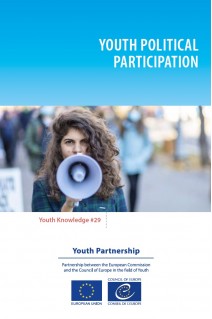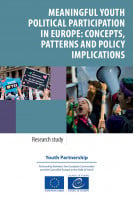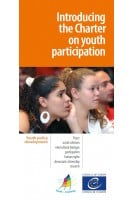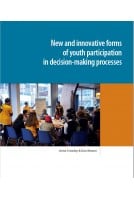Young people’s participation is crucial for shaping and transforming democracies.
Youth political participation is taking place within a context of democratic transformation, including a global decline in the state of democracy, shrinking space for civil society, polarisation of the political and social space, economic crisis and precarity, rapid digitalisation, the impact of the Covid-19 pandemic and, most recently, war. In this setting, we are witnessing a lack of trust in political institutions, an increasing disengagement from the political system and a decline in youth participation in institutional politics.
This Youth Knowledge book reminds us that while the context might be changing, young people’s participation is crucial for shaping and transforming democracies. Moving beyond the traditional binary of “conventional” and “nonconventional”, the authors ask the question: “How are young people engaging with democracies in transformation?”, seeking to understand the ways in which young people are defining their own participation.
This volume includes seven chapters, ranging from the mapping of young people’s involvement in environmental justice movements and climate strikes, dissent and radical kindness, explorations of the understanding of the concepts of liberal democracy, youth voice and European citizenship, as well as the importance and role of values and the context. In addition to the chapters, four personal essays, written by young people themselves, give a glimpse into the ways young people are engaging in political participation to shape their schools, communities and Europe, but also the broader systems on which our current politics is built.
Young people’s political participation, citizenship and relationship with democracy remain a complex topic for youth research, policy and practice. While this publication does not claim to answer all the questions or represent the realities of all young people across Europe, it gives a glimpse into the landscape of youth engagement in a changing world, highlighting realities, trends and main issues.
PREFACE
Lana Pasic
INTRODUCTION – HOW ARE YOUNG PEOPLE ENGAGING WITH DEMOCRACIES IN TRANSFORMATION?
Cristina Bacalso and Tomaž Deželan
CHAPTER 1 – “RADICAL KINDNESS”: THE YOUNG CLIMATE ACTIVISTS TRANSFORMING DEMOCRACY
Benjamin Bowman, Pooja Kishinani, Sarah Pickard and Marion Smith
CHAPTER 2 – YOUTH CLIMATE ACTIVISM: THE FRIDAYS FOR FUTURE ROME EXPERIENCE
Francesca Belotti, Arianna Bussoletti and Stellamarina Donato
CHAPTER 3 – YOUNG PEOPLE AND EU ENVIRONMENTAL JUSTICE: THE 1998 AARHUS CONVENTION
Chiara Scissa
ESSAY – SYSTEM CHANGE NOT CLIMATE CHANGE! HOW CAN WE TRANSFORM SYSTEMS TOGETHER?
Nora Marion Wilhelm
CHAPTER 4 – PLURALISING THE DEMOCRATIC IMAGINARY: YOUTH BEYOND THE LIBERAL-DEMOCRATIC CANON
Sérgio Miguel Seno da Silva Xavier
CHAPTER 5 – “YOUTH VOICE”, DIALOGUE AND DEMOCRACY
Dan Moxon
ESSAY – THE MISSING VOICE: HOW POLISH SCHOOLS LEAVE STUDENTS OUT
Antoni Antoszek
CHAPTER 6 – POLITICAL PARTICIPATION OF YOUNG EUROPEANS: THE ROLE OF LIBERAL VALUES AND DEMOCRATIC CONTEXT
Dragan Stanojević, Bojan Todosijević and Zoran Pavlović
ESSAY – YOUNG EUROPEAN TRANSNATIONALS WEAVING EUROPE’S FATE
Narcis George Matache
CHAPTER 7 – “EUROPEAN CITIZENSHIP” AND YOUNG PEOPLE’S DEMOCRATIC PARTICIPATION: A CASE STUDY OF FINLAND
Maija Lehto
ESSAY – ROADS TO YOUTH EMPOWERMENT: THE ROLE OF COMMUNITY BUILDING
Ana Sofia Martins Pereira, Beatriz Henriques Peixoto Capão, Francesco Capellini, Joana Cristina Rodrigues Freitas and Joana Sofia Arêde Richa Martins
CONCLUSIONS – WHAT TO DO WITH YOUTH POLITICAL PARTICIPATION?
Tomaž Deželan, Cristina Bacalso
EDITORS’ AND AUTHORS’ BIOGRAPHIES








